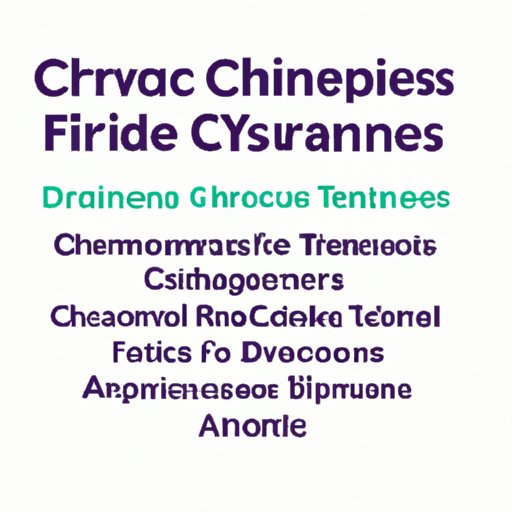
Introduction
Chronic fatigue syndrome (CFS) is a debilitating disorder that affects millions around the world. It is characterized by severe fatigue and other symptoms that can leave individuals feeling exhausted and unwell. If you or someone you know is battling CFS, it’s reassuring to know that there are increasingly new treatments and management options available to help manage symptoms and maintain a decent quality of life. This article aims to provide readers with the latest treatments and management options currently available for individuals dealing with chronic fatigue syndrome.
7 Latest Treatments for Chronic Fatigue Syndrome You Need to Know About
There are various latest treatments available that can help improve the symptoms of CFS. Here are seven of the latest treatment options you should know about:
1. Ampligen therapy
Ampligen is a medication that seems to have some benefit in treating CFS. It is an immune modulator and appears to work by boosting immune function to help the body fight off infections better. However, the treatment requires infusions and is quite expensive.
2. B-12 injections
Vitamin B-12 is essential for red blood cell production and is commonly used to treat anemia. However, researchers have found that B-12 injections can increase energy levels and decrease fatigue in people with CFS.
3. Pacing
Activity pacing is one of the essential management options for CFS. Pacing involves pacing your daily activities to avoid pushing yourself too hard and crashing. It is a way of conserving energy and managing fatigue by setting realistic goals and taking regular breaks.
4. Cognitive-behavioral therapy (CBT)
Cognitive-behavioral therapy is a type of counseling that helps individuals learn about CFS, develop coping strategies, and manage stress and fatigue better. CBT generally involves creating a treatment plan to address both physical and psychological aspects of CFS.
5. Graded exercise therapy (GET)
Graded exercise therapy involves developing a physical exercise program to help gradually increase physical activity levels. It is a way of gradually increasing activity levels without pushing too hard, and it is beneficial if done correctly.
6. Sleep management
Sleep management is an integral part of managing CFS symptoms; this involves developing good sleep hygiene, such as avoiding naps, creating a sleep schedule and avoiding caffeine and stimulants. Sleep is essential for energy restoration and pain management.
7. Dietary changes
Dietary changes, including avoiding processed foods and artificial sweeteners, reducing caffeine and sugar intake, and taking supplements, can improve CFS symptoms. Dietary changes can reduce inflammation, improve gut health, and boost energy levels.

A Comprehensive Guide to the Latest Chronic Fatigue Syndrome Treatments
If you have CFS, many treatment options can help you manage your symptoms. It can be overwhelming to decide which treatment options are right for you. To help, the following details the latest treatments available and divides them into categories:
Medication
Ampligen is the most recognized treatment for CFS. Still, other medications can, in some cases, also help alleviate symptoms. Certain medications that can manage other particular symptoms, such as pain or sleep disorders, can complement, not cure, CFS symptoms. Your physician can guide you on the medication that’s best suited to managing your symptoms.
Therapies
CBT and GET are becoming increasingly recommended standard treatments for CFS, with some evidence of their effectiveness. Both therapies are well researched, and they deal with changing behaviors. Other alternative therapies such as massage, acupuncture, and chiropractic can also complement CFS management, though research data supporting their effectiveness is currently limited.
Lifestyle Changes
Aerobic activity, such as moderate-intensity physical activity like yoga or tai chi, is ideal for CFS management, but evidence supporting the effectiveness of more vigorous exercise is currently inadequate. Lifestyle modifications, such as a healthier sleeping pattern, a strict routine, and a balanced diet, can play an essential role in CFS management.
From Medication to Lifestyle Changes: Exploring the Latest Treatments for Chronic Fatigue Syndrome
Treatment options for CFS have come a long way since the early days, with constant innovations in management methods and therapies. As our understanding of the condition continues to evolve, the use of therapies and treatments has extended beyond traditional medications. Management now involves lifestyle changes and alternative therapies.
Emerging treatments that can help improve CFS symptoms are now mainly lifestyle-based and include the use of conscious and deliberate efforts to create a life that supports healthy living. Examples include mindfulness practices and incorporating good sleep habits, consuming a balanced diet, and engaging in light exercise. Deliberately slowing down and taking the time to appreciate the habits and routines that boost productivity and general well-being can lead to a more productive and meaningful lifestyle.
Breaking Down the Latest Research on Chronic Fatigue Syndrome Treatment Options
Research studies have contributed significantly to CFS management and the understanding thereof. The following highlights some recent studies on CFS management:
1. Low-Dose Naltrexone
Low-dose naltrexone is an off-label medication that has been used to treat CFS. It appears to work by stimulating the immune system and reducing inflammation. The medication appears to have limited side effects is relatively inexpensive and non-toxic.
2. High NAD+ Treatment
Studies suggest that increasing NAD levels with Intravenous Vitamin Therapy could help with CFS. NAD+ is an essential coenzyme that works in the mitochondria to produce energy. Daily supplementation or therapy-based NAD treatment can help the body’s metabolic regulation and energy production.
3. Antiviral medications
Many CFS patients experience reactivated infections such as Epstein Barr Virus -EBV. Therefore, new studies suggest that antiviral drugs may reduce viral infections in CFS patients. Medications such as Valtrex, which are relatively inexpensive and non-toxic, are promising in combating EBV.
Revolutionary Therapies and Techniques for Chronic Fatigue Syndrome Sufferers
Apart from the conventional medication, therapies, and stress reduction treatments, new revolutionary therapies aim to address CFS with a highly personalized and patient-focused approach. These act holistically and are often precise, non-invasive and natural revamp the body’s natural healing abilities. Here are a few innovative non-drug therapies:
1. Neurofeedback
Neurofeedback is an intervention that aims at influencing brain function. It involves the use of EEG and a computer program to monitor and control brain waves. Through sensory and mental exercises, EEG changes, and relaxation techniques, this technique aimed at improving cognitive and physical performance.
2. Light Therapy
Light therapy is a safe and natural method of dealing with depression and sleep dysfunction, typical CFS symptoms. Light therapy uses specific wavelengths of light to alter the body’s circadian rhythms and help users improve and regulate sleep-wake cycles.
Beyond Medication: Innovative Approaches to Managing Chronic Fatigue Syndrome Symptoms
Although medication and therapies can help manage CFS, supportive lifestyle activities will improve the management of the condition. These activities focus on developing health-promoting routines that integrate education with diet, sleep, and stress management. Here are a few examples:
1. Mindfulness practices
On average, stress management interventions are beneficial to up to 60% of CFS patients and are critical to improved management of CFS. Mindfulness practice is an effective stress reduction method that helps patients develop skills in staying focused and relaxed.
2. Nutrition
CFS patients need to have a balanced, nutrient-rich diet. Avoiding processed food, sugar, and caffeine and increasing the intake of plant-based products like fruits and vegetables is essential in CFS management.
3. Sleep hygiene
Developing good sleep hygiene like waking up at a set time and creating a sleep schedule is essential to managing CFS. Striving to use the bed only for sleeping and avoiding afternoon naps is also vital.
The Future of Treating Chronic Fatigue Syndrome: Updates and Breakthroughs
The future of CFS management appears promising. Research into CFS is growing, and greater attention is being paid to developing better treatment options. Research shows that personalized interventions such as cognitive training, circadian rhythm targeting, and even antibody profiling could help to manage CFS more effectively.
Conclusion
CFS is a debilitating disorder that can be severe, but new and innovative treatment options continue to provide better relief for sufferers. Although medication and therapies can help with management, lifestyle changes such as sleep hygiene and a nutritious diet play a key role in better CFS symptom management. Finally, it is always essential to consult your physician before starting any new treatment program.





